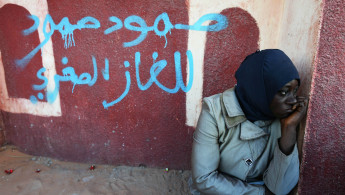Shale gas protesters defy Algiers' iron grip
A global drop in oil prices hit Algeria hard, particularly as more than 95 percent of the country's export earnings derive from gas and oil.
Algeria's economy appears shackled to hydrocarbons, and with revenues lost due to a slump in revenue's the country’s leaders are looking at shale gas as an alternative to conventional supplies.
Protests begin
Late in 2014, protests in Algeria erupted against this controversial extraction technique.
Authorities argued that its experiments with shale gas were not exactly permanent, and tried to convince residents of the southern towns where most of the country's oil and gas reserves lie, to call of the protests.
Farid Abdeladim, a journalist with Liberte newspaper, spent one month with the anti-shale gas movement in southern Algeria.
"Local residents protesting against the entire shale gas operation don't believe anymore in the government’s speeches, and are even less likely with that of Prime Minister [Andelmalek] Sellal."
In a failed attempt to tame the protesters, Sellal told a television crew that the government had not yet decided on whether to use shale gas teqhniques.
"We are a responsible government. I confirm that the exploitation of shale gas is not the order of the day as for now. Algeria has sufficient reserves of conventional energy to meet its needs," he said.
Despite the prime minister's words of calm, activists maintain that the protests will continue, and have no faith in official statements.
Activists accuse shale gas exploration for contaminating water supplies in the area, and they allege that their complaints are being ignored by Algiers.
An anti-shale gas movement kicked off soon after, with a small group of protesters gathering outside the country’s first drilling station at In Salah, around 1,300 kilometres south of Algiers.
Weeks later and demonstrations were held across the country, reaching the cities of Ouargla, Djanet, Laghouat, Ghardaia, and even Algiers.
By mid-January, 15,000 people were demonstrating against shale gas in In Salah, while 4,000 gathered in Tamanrasset and 5,000 in Ouargla.
Government claims
The government says there is no need to explore its shale gas resources now, as conventional reserves will last until 2037.
Official statements suggest that the government will pursue studies for at least four years to assess the environmental and technical aspects of shale gas extraction.
Yet, despite attempts of governing political leaders to calm the tension, protesters have no more faith in official statements.
Demonstrations continued, led by the Coordination for Liberties and Democratic Transition (CLDT), an umbrella group of five main Algerian opposition groups.
On 24 February, a protest by the group was organised in the capital, with hundreds of police deployed to seal off Algiers’ main avenues.
Force was used against the protesters and the authorities were criticised by human rights groups for their heavy-handed tactics.
Despite words of calm, the government does not appear to be backing away from its "experiments" in shale gas.
On 1 March, clashes broke out between police and anti-shale gas protesters outside a camp run by the US-company Halliburton and the state-run Sonatrach close to In Salah.
| I do believe that sooner or later we’ll end up winning. We're patient under the sun and rain. - Aouissat Maamer, protester |
Nationwide protests left 40 police officers injured, according to the interior ministry.
"Before the police attacks, there were many [protest] tents. Now they are all burned," says Mehdi, a 26-year-old unemployed Algerian.
"In Salah, residents are paying visits to those who were injured in the riots. Two young men had surgery at the local hospital," says Bouzid Ichalalen, a journalist who covered the protests for Algerian newspaper El Watan.
Crushing dissent
X-rays obtained by the French-language newspaper show that the two young protesters were shot, with two bullets allegedly hitting the leg and shoulder of the protesters.
According to El Watan, medical and security sources have confirmed that riot police used live ammunition.
From the early days of the protests movement, women played an important role in campaigning.
Around In Salah, women have been on the front line of demonstrations.
In the more conservative city of Ouargla, 800 kilometres southeast of Algiers, women are rarely seen.
"We are conservative people and can't let our wives and sisters go to demonstrate in the streets, it contradicts our traditions," Said argues.
On 14 March, more than 700 people took part in a peaceful rally in Ouargla. They were joined by the Coordination for Liberties and Democratic Transition (CLDT), an umbrella for five of Algeria's main opposition groups.
The protest movement attracted a broad range of Algerians, ranging from Islamist organisations, to the unemployed, and students.
The government, as militants and activists in Algeria well know, will stop at nothing to discourage protest.
Said, 36, a lecturer who didn't want to reveal his full name, says he was laid off by the university a few weeks ago due to his role in the protests.
"The administration in Ouargla's University argued that I wasn’t able to pursue teaching my courses with the students because of my commitment [in the protests],” he says.
Now, he finds himself in an extremely precarious position, unable to provide for his wife and children and in a country with massive unemployment.
He says he is taking legal action against the university administration to get his old job back.
Despite the government attempts to drown out the protesters, it appears the dissidents are more optimistic that their actions are having an effect.
"I do believe that sooner or later we’ll end up winning," says Aouissat Maamer, a teacher.
"We're patient under the sun and the rain. I joined the protests on the first day and I’m not backing off."



